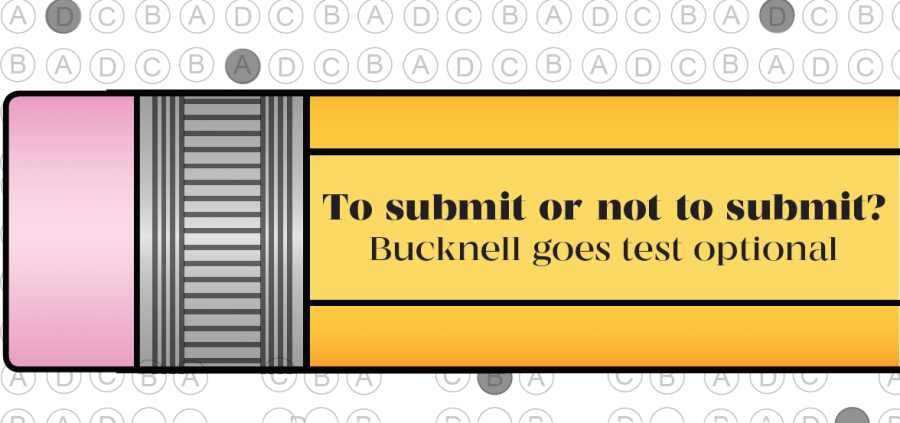To Submit or Not to Submit?
September 5, 2019
The process of applying to college is knowingly not a simple one: weekends of visiting countless universities, hours toiling over SAT and ACT preparation questions, and creative ideas forming to be the topic of your precious Common Application essay – all things completed in anticipation of one hopeful acceptance letter that dictates the next four years of your life.
It is no secret to college applicants that not all public and private institutions require the same documents in order to be accepted. In fact, there are several colleges and universities that allow applicants to forego the process of submitting their test scores. This university is now one of them.
Starting with applicants applying in the fall of 2020, the University will initiate its test-optional policy. Therefore, standardized test scores, including the SAT and ACT, will no longer be required for admittance to the university. While this policy does come with restrictions to certain applicants, including varsity student-athletes (test scores are necessary to calculate Patriot League Academic Index), home-schooled students (scores offer standardized measure of testing) and international students (for credential verification reasons), this new policy will hopefully provide greater access to an increasingly diverse and broader applicant pool. All three academic colleges (the College of Arts and Sciences, the College of Engineering, and the Freeman College of Management) will follow this policy.
The goal behind going test-optional?
Partly, the policy aids the University in its efforts to participate in the American Talent Initiative (ATI). According to the ATI website, the organization is comprised of “a diverse set of public and private colleges and universities with high graduation rates,” and it “seeks to substantially expand access and opportunity for talented, low- and moderate-income students at the nation’s colleges and universities with the highest graduation rates.”
In 2018, Elizabeth Pisacreta et al. conducted a study on ATI’s progress within its first two years of establishment. The reports detail that ATI has “increased enrollment of students who receive federal Pell grants by 7,291 since the 2015-16 school year” and is expected “to enroll 50,000 additional low- and moderate-income students at high-graduation rate institutions by 2025.”
Progressively, ATI hopes to enroll as many of the 319 colleges and universities with consistent six-year graduation rates above 70 percent as possible. Apart from the University, current members include Boston University, Brown University, Bryn Mawr College, Centre College, College of the Holy Cross, Davidson College, Columbia University, Duke University, and Johns Hopkins University.
The specific goals of ATI and the colleges and universities that are enrolled in the organization are to grow communication with low- to moderate-income students, learn how to support low- to moderate-income students, and to expand higher education.
The University hopes to achieve its mission by providing “greater access to students from varying educational and socioeconomic backgrounds,” according to a statement on its website.
“The principle point for going test-optional was to provide greater access to the University,” Dean of Admissions Kevin Mathes said. “We are looking for ways to open our doors to more students.”
Additionally, the purpose of the policy includes creating a more comprehensive application for students who may not succeed in taking standardized tests, but who are equally intelligent as applicants with high standardized test scores.
“We’re making sure students aren’t letting a single test score dictate whether they consider the University,” Mathes said. The University considers a “holistic admissions practice”— one that favors not merely one factor, such as test scores, but also diverse talents and abilities of the applicants.
Rather than rely solely on test scores, Vice President of Enrollment Management Bill Conley says that the University would rather place importance on “a student’s academic transcript along with the assessment of their character and the kind of challenges they’ve taken on to get where they are.”
Does not submitting test scores hurt an applicant?
Not necessarily, according to Conley. “Every application review begins with the premise: find the evidence that supports admitting the student. Now, if the student chooses not to offer testing as evidence, we won’t wonder why. We will focus on other factors,” Conley said.
Thus, when deciding whether or not to submit their test scores, applicants should consider the strengths of their transcripts, their extracurricular activities, their hobbies and talents and any other challenges or stories that defines them.
In addition to ATI, the University belongs to the Character Collaborative, an organization who shares the similar goal of “join[ing] educators with a common interest in elevating non-academic factors and character-related attributes in the admissions process,” according to a statement on their website. In a holistic approach, the Character Collaborate’s mission is to change higher and secondary-level education admissions practices, teaching institutions how to increase the significance of character strengths and achievements in the application process.
Wake Forest University, New York University, Boston University, George Washington University, Middlebury College, Hamilton College, Wesleyan University and Bates College are among other colleges and universities who share the goals of increasing educational access to a wider and more diverse pool of applicants, and of considering students in a holistic perspective, according to US News.
The University’s test-optional policy is a part of a five-year pilot to see if the university can help achieve its goals that echo those of the ATI and the Character Collaborative.
So, as for advice to students applying to the University?
Do not stress if you cannot afford preparation for and are not the best at taking standardized tests because the University will not punish you, but will instead work with you to view you in a holistic approach—in light of your high school academic success, challenges and character strengths.





















